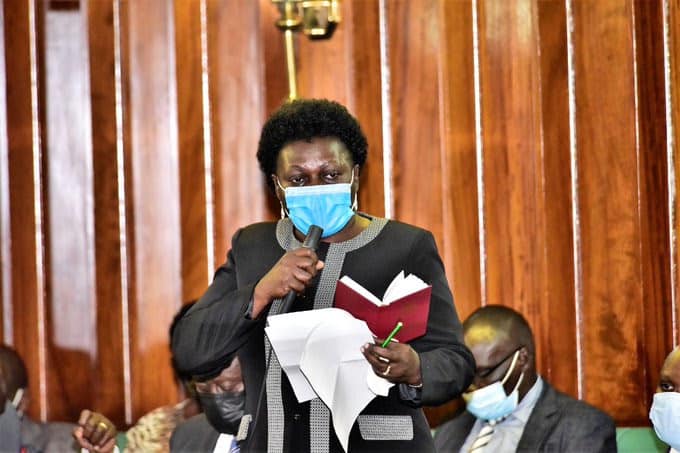Sarah Opendi pushes for six-month deadline on domestic violence cases
She made the proposal during a training of MPs on how to strengthen laws to combat domestic violence, organized by the Center for Domestic Violence Prevention (CEDOVIP), with a focus on strengthening provisions in the Marriage Bill that are being prepared for tabling before Parliament.

Sarah Opendi, the Tororo District Woman Representative has proposed to have a six-month timeframe within which courts are supposed to decide on cases of domestic violence, saying that delays in the execution of justice have led to the increase of the vice within Uganda.
She made the proposal during a training of MPs on how to strengthen laws to combat domestic violence, organized by the Center for Domestic Violence Prevention (CEDOVIP), with a focus on strengthening provisions in the Marriage Bill that are being prepared for tabling before Parliament.
“We are aware that some of the cases take forever in court, so we are proposing an amendment and this is where it is coming in the sexual offenses bill but also the domestic violence act should provide a period within which cases must be resolved so that they aren’t in court for 5 years. But we are also hoping that the Judiciary will be able to create a division to specifically deal with these matters. Let us amend the law to have timelines within which cases are resolved 6 months to me is it,” said Opendi.
Margaret Aleper (Kotido DWR) called for closer scrutiny of cultural practices like payment of dowry, to make it commensurate with the current economic trends, citing the practice in Karamoja where some families still demand 100 heads of cattle as bride price.
She noted that this creates an avenue for the women to be treated like property in marriages highlighting that, “There are many cultures that still draw dowry to marry their daughters like in Karamoja, we still have high dowry demands where women are married with 50-100 animals which is still high and yet the economy is boring everywhere, and yet Karamoja which used to have animals they’re no animals.”
In her explanation Aleper further stated that it’s the women’s forums, to fit what is in societies because women shouldn’t be bought or sold, since they aren’t goods and this can just be a token of appreciation to be shared by the family that’s giving the woman.
“But when we engage cultural and religious leaders and the community, the issue of dowry can be changed and harmonized so we just are in a marriage with our partners without being seen as goods by the spouses,” explained Aleper.
“For us who come from the North, when I heard about the 100 cows, I thought I was the one who took the many cows because I was married off with 25 cows, and in our place, that is a serious number. But I think as legislators, we have got to start analyzing the impact of all this price that is paid for marriage, because somebody was talking about 100 cows and when I got married 20 years ago, until now the clan and culture demand that you’re completely “bought“, you no longer belong to your family, so everything that you are doing is meant to pay for that in my thinking as you grow older,” said Agnes Apea (Amolatar DWR).
“Yesterday a colleague said that for us MPs, the last thing you can say if you want to come to Parliament is to leave your husband, you would rather die there, that is the dilemma that we have as women. Because immediately, you have to adopt the husband’s name, the second thing is that for us who went to church, you’re supposed to hold a joint account, you cease to have control over your own money, you cease to have control over how many children you are supposed to have. Some of us only had girls, but the clan demands that after 50 years plus, we must produce a boy,” added Agnes Apea (Amolatar DWR).
There was a slight increase in the cases of domestic violence registered in 2022 in Uganda, according to the 2022 Annual Crimes Report. There were 17,698 reported cases last year compared to 17,533 in 2021, according to the report released by Police







